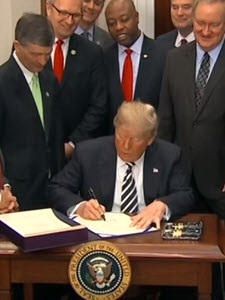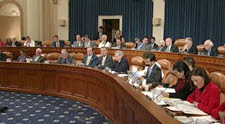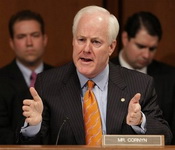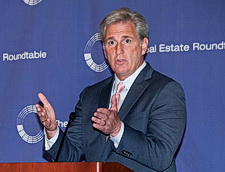The Environmental Protection Agency (EPA) on June 12 announced the first-ever federal government awards for energy efficiency in leased office spaces. Many Roundtable members and their tenants are recognized among the award’s inaugural winners. (EPA list of tenants and landlords)
 |
|
SPAC Chairman Tony Malkin (Chairman and CEO, Empire State Realty Trust ) stated, “This is a great example of the Roundtable at work. We took best industry practice, formulated policy around it, and worked with staff and members of Congress to develop legislation for the good of the economy, our industry and the environment.” |
- Originally envisioned by The Roundtable’s Sustainability Policy Advisory Committee (SPAC), EPA’s ENERGY STAR for Tenants program has been long-supported by the industry. After the enactment of the 2015 “Tenant Star” law, EPA was tasked with piloting the branding program for energy-efficient tenant spaces that met certain design criteria. (Roundtable Weekly, June 30, 2017)
- SPAC Chairman Tony Malkin (Chairman and CEO, Empire State Realty Trust) stated, “This is a great example of the Roundtable at work. We took best industry practice, formulated policy around it, and worked with staff and members of Congress to develop legislation for the good of the economy, our industry and the environment. At the same time, our Sustainability committee worked with the Department of Energy and the EPA within their structures, rules, and regulations for years to create a new label for energy efficient tenant spaces, to complement existing programs that award whole-building efficiency. This voluntary program will lead to a significant increase in cost-saving leased spaces as companies vie for EPA’s tenant label in the future.”
- Roundtable President and CEO Jeffrey DeBoer noted the national value of the new federal recognition program. “Without any tax credit or subsidy, EPA’s new seal of approval can motivate tenants and landlords across the country to demonstrate their commitment to energy efficiency in leased commercial building space. As EPA’s new office space program expands, CRE leaders will have more opportunities to distinguish their buildings for investors, tenants, and the Millennial workforce who place a premium on sustainable assets.”
- To earn the label, applicants must verify how they drive energy efficiency in five key areas in the design and construction of high performance leased spaces. (EPA Documents and Tools for Tenants)
- As funding for the federal ENERGY STAR program also affects the new EPA Charter Tenant program, a Senate Appropriations subcommittee on Tuesday affirmed the Trump Administration’s recommendation to continue ENERGY STAR program funding for FY2019 (starting October 1, 2018). For the agency’s programs overall, the Senate panel recommended that appropriations be maintained at the status quo for the next fiscal year. (The Hill, June 12)
The 2018 ENERGY STAR Charter Tenants program was a focus during today’s SPAC’s meeting in Washington, which included presentations from EPA and other key federal agency officials.









